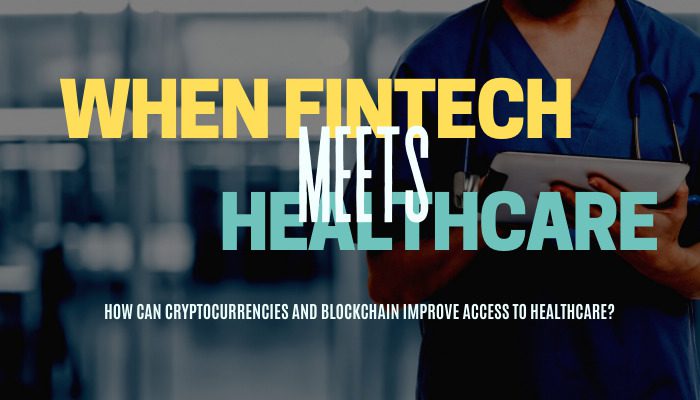Cryptocurrencies and blockchain technology are used in a wide array of new applications – including in healthcare. Fintech start-ups are the catalyst for many of these recent market innovations – and they aren’t just focused on the banking and financial services sector. While finance is necessary for individuals and organisations of all sizes, both can struggle to access it. Yet recent advances in Fintech suggest this disparity can be addressed by capturing the market value of data and repurposing it as payable “currency”. This radically new decentralised finance (DeFi) concept is one that many, including healthcare administrators, are starting to take seriously.
With the COVID-19 pandemic showing how critical it is to have access to high-quality healthcare, and with access to it in some parts of the world falling short because of poverty and other factors, the likes of the British Medical Journal (BMJ) are currently exploring how the obstacles to healthcare access can be overcome in Dominique Vervoort et al’s BMJ Innovations article, “Blockchain, health disparities and global health”.
Vervoort and his co-authors Camila R Guetter and Alexander W Peters write: “Health disparities remain vast around the world and are perpetuated by error-prone information technology systems, administrative inefficiencies and wasteful global health spending. Blockchain technology, a novel, distributed peer-to-peer ledger technology, is increasingly used in various industries to disintermediate, improve efficiency and transparency and reduce costs; however, its use in healthcare and global health has remained limited.”
In their article they argue that there are opportunities to leverage blockchain technology “in global health in terms of cryptocurrencies and health financing, supply chain management, health records, identification and verification, telehealth and misinformation.” They argue that it be leveraged to help mitigate the healthcare impact and disparities arising from the COVID-19 pandemic in particular.
Innovating healthcare
Dr. David Putrino and Dr. Jamie Wood are health technology innovation experts in one of the largest hospital systems in the United States. They are tasked with exploring emerging technologies that will lead to disruptive innovations in healthcare. In line with this vision, they are collaborating with Decentr, an EU blockchain startup that is creating a digital currency backed by the value of data stored in their ecosystem.
The goal is to explore the development of a variety of technologies in conjunction with Decentr’s own pipeline; with everything from simple decentralised communication tools, all the way through to re-imagined clinical and research systems incorporating data as value. They include platforms to enable patients to harness the value of their anonymised data, and more easily contribute to large-scale clinical trials, which are often inaccessible to the majority of eligible participants.
Dr. Putrino states: “In the wake of the COVID-19 pandemic, we have seen an unprecedented surge in patient-led research, highlighting both the appetite of patients to be more actively involved in clinical research as well as the value of this approach in terms of rapid discovery. Technologies developed within the Decentr pipeline have the potential to empower millions of patients who are eager to contribute their data to clinical trials. Similarly, this may provide opportunities for clinicians and researchers to utilise their own data value and collaborations within health and science to leverage alternative streams of funding for ongoing research and development.”
However, data protection can be an obstacle. Rich James, CCO of Decentr, referring to GDPR and HIPAA, comments:
“The healthcare industry has a problem with ensuring health information exchanges (HIE) are secure, efficient, and interoperable: blockchain technology shows great promise to assist with this. Using blockchain-encoded medical records, patients will instantly be able to grant doctors access to their entire life’s records from their own Smartphone, thus eliminating the potentially life-threatening gaps of data that exist from one doctor’s office to another. Blockchain will open access to data for medical researchers and bring about a new era in AI-driven personalised medicine; this in turn will save on costs, significantly reducing medical errors while leading to incredible innovation in the space.”
Deloitte’s report, ‘Blockchain: Opportunities for health care: A new model for health information exchanges’ adds: “Blockchain technology has the potential to transform health care, placing the patient at the centre of the healthcare ecosystem and increasing the security, privacy, and interoperability of health data.”
Data to reduce costs
Decentr, in collaboration with Drs. Putrino and Wood see this as the future of healthcare and aim to create a platform to securely store and share patient data on-chain, while extracting the market value from this data to offset the costs of healthcare providers’ medical and scientific research, and ultimately the cost of patient care.
Dr. Wood says, “We have long been supporters of exploring strategies to decentralise the sharing of scientific knowledge, clinical information and technology, as we believe in the profound impact that it can have on healthcare and humanity.”
Dr. Wood believes the way information is shared, and the process in which patients and research participants are included is somewhat broken and outdated. The existing technologies at the disposal of many health systems don’t help to resolve the issues they face. With this broader problem in mind, he turned to Decentr to realise his vision, which is in part in line with the aim of closing the disparities in access to healthcare.
Current technologies
James finds that current technologies do not fully address these requirements, because they face limitations related to security, privacy, and full ecosystem interoperability. He claims these are all issues Decentr addresses as part of one system. He explains how this relates to the work that Drs. Putrino and Wood do:
“It is encouraging to see that experienced healthcare leaders can see the potential in what we are doing at Decentr, in terms of secure, immutable end-to-end encrypted data being made more widely available on-chain, which has the potential to add quality to healthcare systems and improve health outcomes. The baseline issue right now – despite the apparent ubiquitous of technology and the internet – in terms of communication and technology systems in healthcare it is still very difficult, and never happens, that medical team A in city B, for example, knows what medical team C is doing in city D – even if they are treating the same cause or condition and would invariably benefit from the real-time exchange of information.”
He says no widely used information system exists to relay this information, arguing that to do so with the current infrastructure would create potential security and privacy issues. It is therefore safer for practitioners to not bother to share it, leaving them to continue to work in isolation from one another. This requires the creation of a single, robust, and secure platform to encrypt patient and other data to make information more accessible to research and patient care.
Data becomes currency
Drs. Putrino and Wood are passionate about the potential of Decentr’s technology to target some of the causes of healthcare disparities. In the traditional healthcare ecosystem, patients with complex medical needs are often significantly disadvantaged when it comes to access to affordable care. However, by turning personal data into something of value, there is potential to empower these patients to use their data in a way that directly benefits them. This can create a truly circular data economy.
James explains that Drs. Putrino and Wood were attracted to the idea because they both believe that making data a form of currency is “a key mechanism to equitably address health needs and more broadly inefficiencies in every industry.”
Unfortunately, making people healthy is often perceived as not being profitable within the current global market and economic system that demands ever-growing GDP. To illustrate this, James comments that 10% of UK GDP in 2018 was for healthcare expenditure, which was up from 9.8% in 2017 while in the US in 2019 healthcare spending was up by 4.6%, reaching $3.8 trillion.
He argues that while the healthcare industry “continues to accrue as many inherently worthless ‘third-party units of exchange’ (such as Fiat currencies) as possible, it is, ironically, to the benefit of a ‘healthy’ economy to make sure we all keep getting sicker. No one is going to give up what is effectively 17.7 percent of the US GDP just to make the population healthier.”
Affordable research and care
James believes that a data-currency turns this “perverse practice” on its head by improving the security, quality and immutability of the data and the underlying system. In turn this can lead to better and more effective patient treatments and outcomes that can contribute to this data. This creates the opportunity to undertake and provide more affordable research and care.
By making data a currency, opportunities will also exist to inspire data generation, and ensure that the reuse and exchange of that data is not only fair and equitable but funded by a source that is part of a true circular economy, and not an end in and of itself. So, Fintech can meet and help healthcare in many ways.
By Graham Jarvis, Freelance Business and Technology Journalist



































